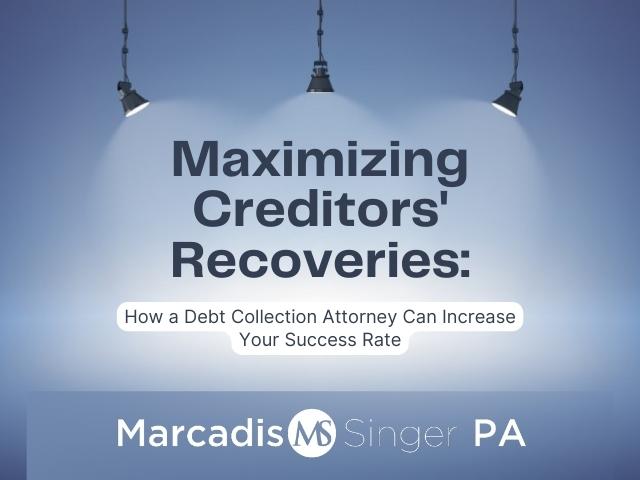How a Debt Collection Attorney Can Increase Your Success Rate
I. Introduction
 A. Brief overview of the challenges creditors face in debt collection
A. Brief overview of the challenges creditors face in debt collection
Debt collection can be difficult and time-consuming, often resulting in a financial loss for creditors. Many debtors fail to make payments on time or at all, making it challenging for creditors to recover their money.
B. Importance of maximizing recoveries for businesses and the economy
Maximizing recoveries is crucial for businesses to maintain a healthy cash flow and continue operating smoothly. It also benefits the economy by preventing bankruptcies and job losses, leading to a more stable financial environment.
C. Introduce the role of a debt collection attorney in increasing the success rate
A debt collection attorney is a legal expert who specializes in helping creditors recover unpaid debts. They have the knowledge, skills, and resources necessary to navigate the complex legal landscape of debt collection and increase the chances of success for their clients.
II. Knowledge of Local, State, and Federal Laws
A. Overview of relevant laws and regulations
Debt collection is subject to various federal and state laws, including the Fair Debt Collection Practices Act (FDCPA) and the Consumer Financial Protection Act (CFPA). Other laws that may apply to debt collection include the Uniform Commercial Code and state-specific debt collection laws.
B. The importance of understanding jurisdiction-specific rules
Each state has its own laws and regulations governing debt collection practices, such as statutes of limitations, exemptions, and disclosure requirements. Debt collection attorneys must understand these jurisdiction-specific rules to ensure compliance and avoid legal missteps that could harm the creditor’s case.
C. How a debt collection attorney’s expertise can prevent legal missteps and ensure compliance
A debt collection attorney’s in-depth knowledge of the relevant laws and regulations can help prevent legal missteps and ensure compliance, ultimately increasing the chances of success in debt recovery cases. They can advise creditors on the legal requirements and limitations of debt collection practices in their jurisdiction and help them avoid common legal pitfalls.
III. Effective Negotiation Skills
 A. The role of negotiation in debt collection
A. The role of negotiation in debt collection
Negotiation is critical to debt collection, as it allows the debtor and creditor to reach a mutually beneficial agreement. Negotiation can help avoid costly and time-consuming legal proceedings and improve the chances of the creditor recovering their debt.
B. Techniques and strategies used by debt collection attorneys
Debt collection attorneys use various negotiation techniques and strategies, such as building rapport, identifying common ground, and exploring creative solutions. They may also leverage their knowledge of the debtor’s financial situation, legal options, and motivations to negotiate a favorable outcome for the creditor.
C. The benefits of having a skilled negotiator on your side
Having a skilled negotiator on your side can help increase the chances of reaching a successful outcome in debt collection cases. They can effectively communicate with debtors and find solutions for both parties. A skilled negotiator can also help protect the creditor’s interests, ensure compliance with legal requirements, and maintain a professional and constructive relationship with the debtor.
IV. Navigating the Legal System
A. Court processes and procedures in debt collection cases
Navigating the legal system in debt collection cases can be complex, involving various legal procedures and strict deadlines. Debt collection cases may be heard in state or federal court and involve pretrial motions, discovery, trial, and appeals.
B. The benefits of legal representation in court
Legal representation can help creditors navigate the legal system more effectively and ensure their case is presented in the best possible light. A debt collection attorney can represent the creditor in court, handle paperwork and filings, and present a strong case that maximizes the chances of success.
C. How a debt collection attorney can streamline the litigation process and improve outcomes
A debt collection attorney can streamline the litigation process by handling paperwork, filing documents, and representing the creditor in court. They can also use legal strategies to increase their chances of success, such as motions for summary judgment, discovery requests, and evidentiary objections. By ensuring that the litigation process is efficient and effective, debt collection attorneys can improve outcomes for their clients.
V. Asset Discovery and Recovery Techniques
A. Identifying debtor assets to maximize recoveries
Identifying debtor assets is crucial for maximizing recoveries, enabling creditors to target specific assets for seizure or liquidation. Assets targeted for recovery include bank accounts, real estate, personal property, and accounts receivable.
B. Legal tools and strategies for asset recovery
Debt collection attorneys can use legal tools and strategies for asset recovery, such as obtaining judgments, garnishing wages or bank accounts, placing liens on property, and conducting asset searches. They may also work with private investigators and other professionals to uncover hidden assets and locate debtors.
C. How a debt collection attorney’s expertise can uncover hidden assets and increase collection success
A debt collection attorney’s expertise can be invaluable for uncovering hidden assets and increasing collection success. They have access to specialized resources and knowledge of legal procedures to help them locate and seize assets that might otherwise go unnoticed. By maximizing the recovery of assets, debt collection attorneys can help their clients recover more of their unpaid debts.
VI. Collaborating with Collection Agencies
A. The role of collection agencies in debt recovery
Collection agencies are often used by creditors to recover debts that are past due. They specialize in locating debtors, communicating with them, and collecting payments.
B. How a debt collection attorney can enhance the efficiency of collection agencies
A debt collection attorney can work collaboratively with collection agencies to enhance efficiency by providing legal guidance, identifying barriers, and facilitating negotiations.
C. Coordinating efforts for optimal results
By coordinating efforts between the debt collection attorney and collection agency, creditors can increase their chances of success and recover more of their unpaid debts.
VII. The Long-Term Benefits of Hiring a Debt Collection Attorney
A. Improving overall debt collection success rates
Hiring a debt collection attorney can improve overall debt collection success rates by providing legal expertise, strategic planning, and effective communication.
B. Strengthening credit policies and practices for future collections
Working with a debt collection attorney can also help strengthen credit policies and practices for future collections, ultimately improving the creditor’s financial health and stability.
C. Building a strong foundation for sustainable business growth
Hiring a debt collection attorney can help build a strong foundation for sustainable business growth by maximizing recoveries and strengthening credit policies and practices.
VIII. Conclusion
A. Recap of the advantages of hiring a debt collection attorney
Hiring a debt collection attorney can provide creditors with various benefits, including legal expertise, strategic planning, effective communication, and increased success rates.
B. Encourage creditors to consider partnering with an experienced attorney to maximize their debt recovery efforts
Creditors should consider partnering with an experienced debt collection attorney to increase their chances of success in debt recovery cases and build a strong foundation for sustainable business growth.
External links:
1. The Federal Trade Commission’s Debt Collection FAQs: https://www.consumer.ftc.gov/articles/debt-collection-faqs
2. The Consumer Financial Protection Bureau’s Debt Collection Resources: https://www.consumerfinance.gov/consumer-tools/debt-collection/
